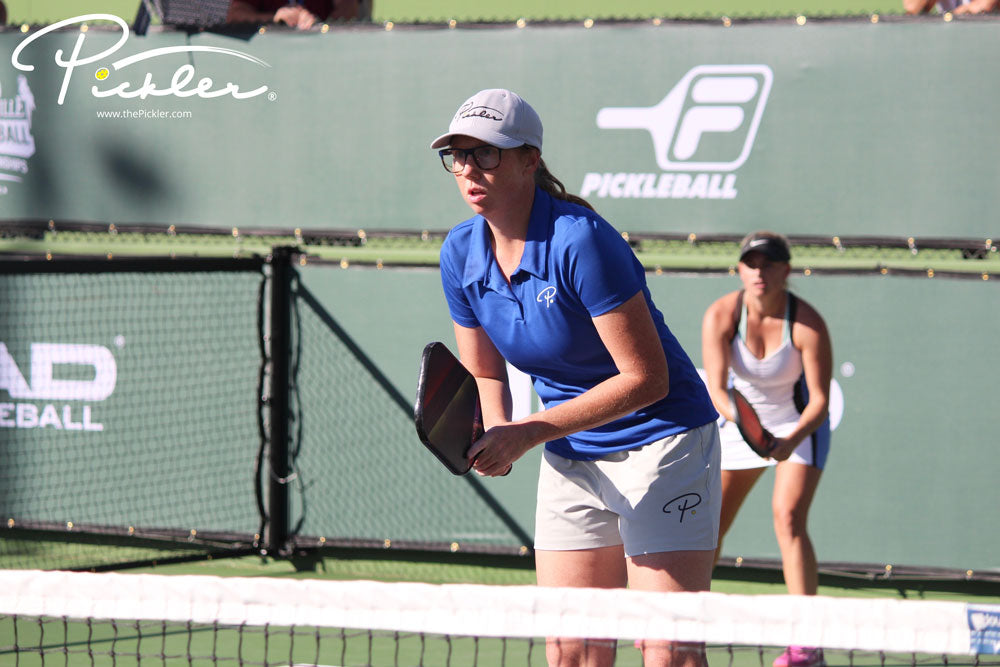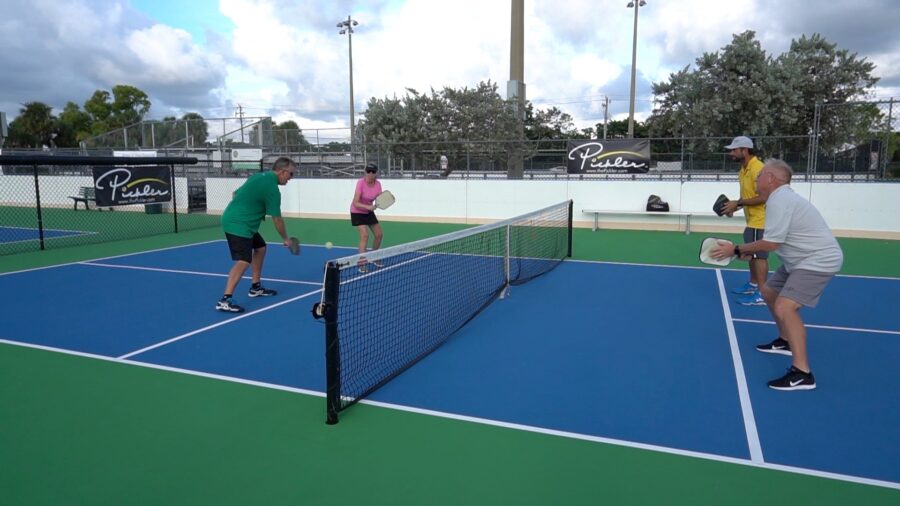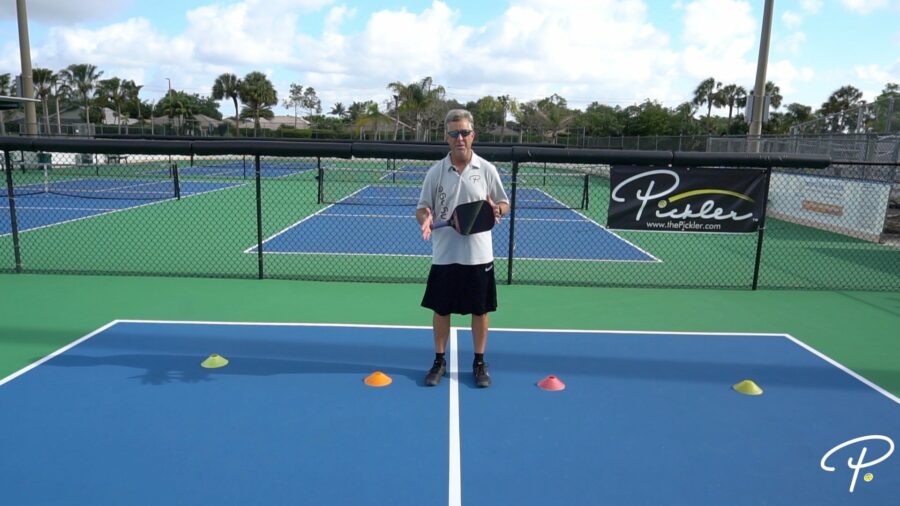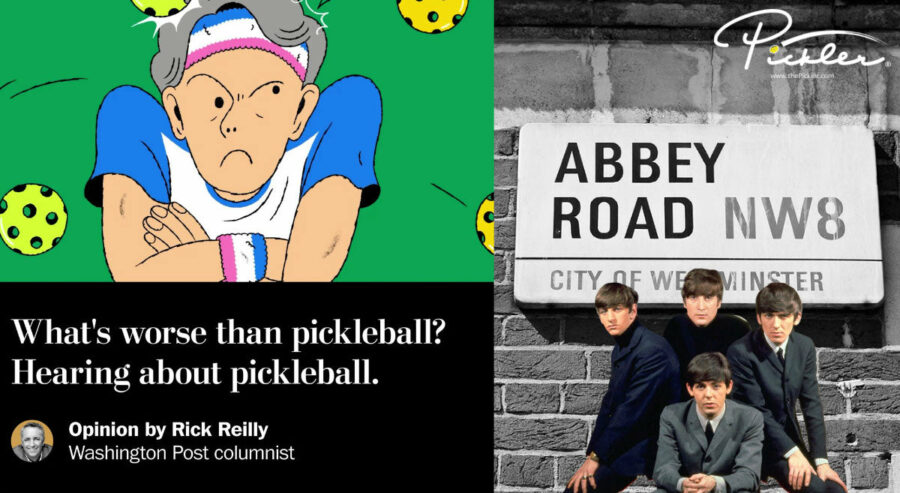Prior to the start of a pickleball tournament, it is important to take the time to learn the pickleball tournament format, scoring, and other rules that may apply on the court. Each pickleball tournament’s rules may vary, as some strictly follow the USA Pickleball Rules (like the APP Tour pickleball tournaments), while others do not (like the PPA Tour pickleball tournaments, which have a few different rules). Be aware of the specific rules that apply to the tournament you are playing in.
It is also important to understand how you will be notified of when and where you will be playing on the day of the event, as a common mistake on tournament days is not showing up on time! This will help avoid stress, controversy, and silly rules mistakes during competitive play in a pickleball tournament.
This pickleball blog will break down some of the “must-know” pickleball tournament rules for any pickleball tournament – particularly, this pickleball blog will break down the rules for a USA Pickleball-sanctioned pickleball tournament.

Pickleball Tournament Formats
Pickleball Tournament Event Categories
Pickleball tournaments generally have the following event categories:
- Men – Singles and Doubles
- Women – Singles and Doubles
- Mixed – Doubles
To play in a men’s or women’s event, only members of the applicable gender are permitted to play. To play in a mixed doubles event, one partner should be male and the other partner should be female. When a doubles team is classified by age and/or skill level, then the partner with the younger age controls what age group the doubles team may play in (for instance, if a 19 year old plays with a 60 year old, then the doubles team will play in the 19+ division), and the partner with the higher skill level controls what skill level the doubles team may play in (for instance, if a 5.0 player plays with a 3.5 player, then the doubles team will play in the 5.0+ division). If any junior player (a player who is 18 years old and younger) desires to play in a pickleball tournament that does not have a junior division, then the junior player may play in the 19+ age division.
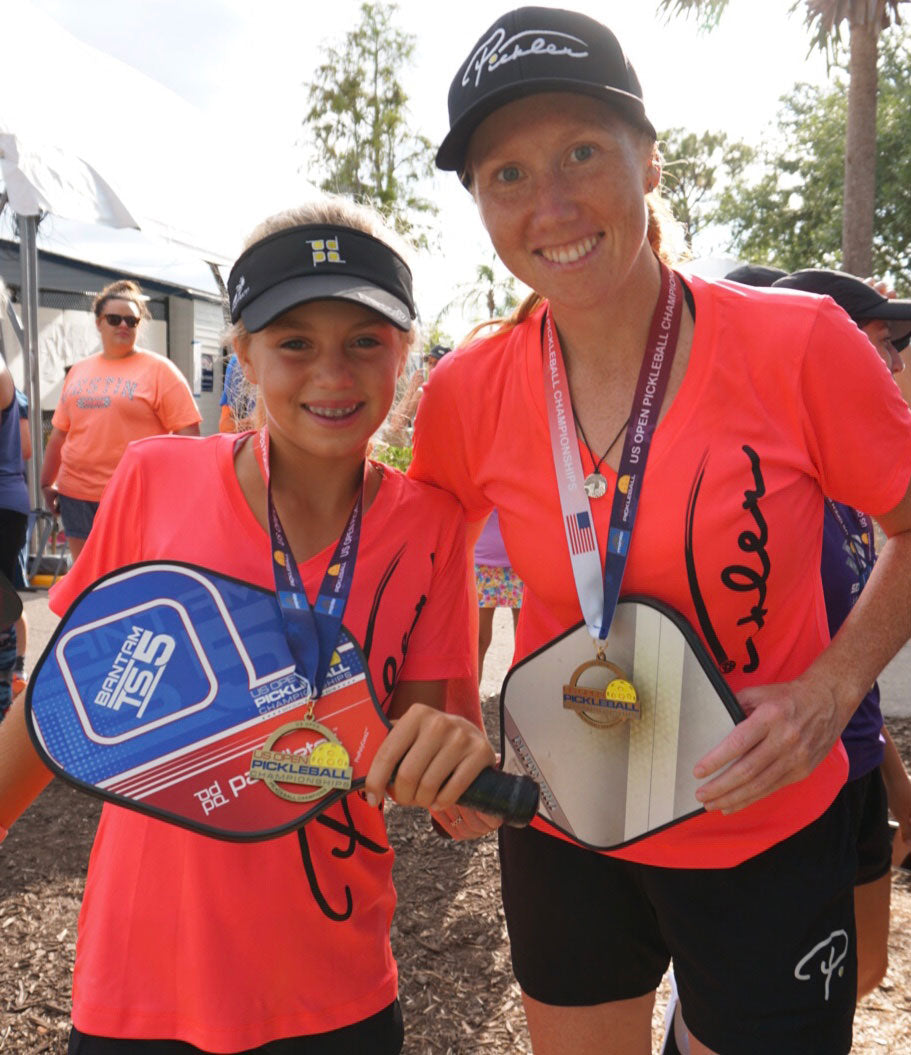
Pickleball Tournament Scoring Options
The recommended pickleball tournament scoring option is a pickleball match that is best two out of three games to 11 points, win by 1 or 2 points. Common alternative pickleball tournament scoring options are a pickleball match that is one game to 15 points, win by 1 or 2 points, or one game to 21 points, win by 1 or 2 points.
Pickleball Tournament Formats
The Official Rulebook for pickleball provides for four pickleball tournament formats:
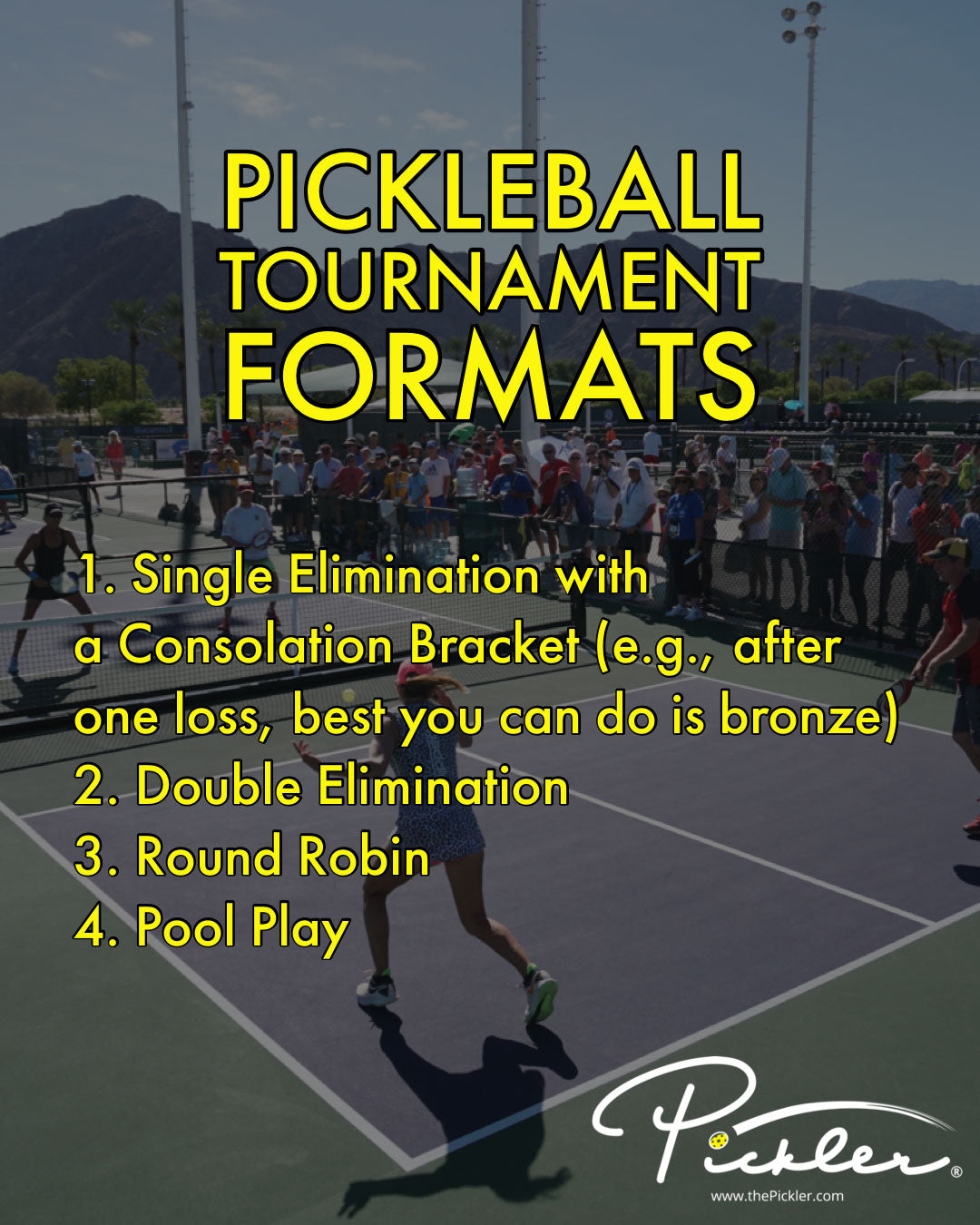
- Single Elimination with a Consolation Bracket – Pickleball tournaments may use a format of single elimination with a consolation bracket. This means that if a player/team loses, they will fall to a consolation bracket, where they continue to play until the player/team loses for a second time. However, the best a player/team from the consolation bracket can do is bronze or third place. Only the players/teams remaining the winner’s bracket will play for gold/silver or first/second place.
- Double Elimination – Pickleball tournaments may use a format of double elimination. This means that if a player/team loses, they will fall to a consolation bracket, where they continue to play until the player/team loses for a second time. Unlike single elimination with a consolation bracket, a player/team from the consolation bracket can fight all of the way back to win gold/silver or first/second place. This is because the winner of the consolation bracket will play the winner of the winner’s bracket. The winner of the consolation bracket must beat the winner of the winner’s bracket twice (in other words, win two pickleball matches) in order to win gold or first place.
- Round Robin – Pickleball tournaments may use a round robin format, where all of the players/teams play one another. Then, the winning player/team is chosen based on win-loss records. If there is a tie, then the tie is broken based on head-to-head matches. If there is still a tie, then the tie is broken by point differential. If a tie remains after point differential, then the tie is broken by head-to-head point differential. If there is still a tie, then the final tie breaker is by point differential against the next-highest team.
- Pool Play – Pickleball tournaments may also use pool plays. Pool plays would be treated as a round robin, where each player/team in the pool plays one another. Then, based on the results of the pool play, teams would be seeded in either a single elimination or double elimination bracket.
In all pickleball tournament formats, players/teams are guaranteed a minimum of at least two pickleball matches.
Service and End Selection Rules
Selecting Serve, Receive, Side, or Defer During Matches in Pickleball Tournaments
To determine which player or team selects end, serve, receive, or defer, any fair method may be used. For instance, picking whether a 1 or 2 was written on the back of the scoresheet or playing rock, paper, scissors. The winning player or team will then either select (1) serve or receive, (2) which side to start on, or (3) defer the selection to the opposing team. If the winning player or team picks serve or receive, then the opposing team will select sides. If the winning player or team selects sides, then the opposing team will pick serve or receive. The winning player or team could also defer to the opposing team. Once a player or team makes a selection, the selection may not be changed.
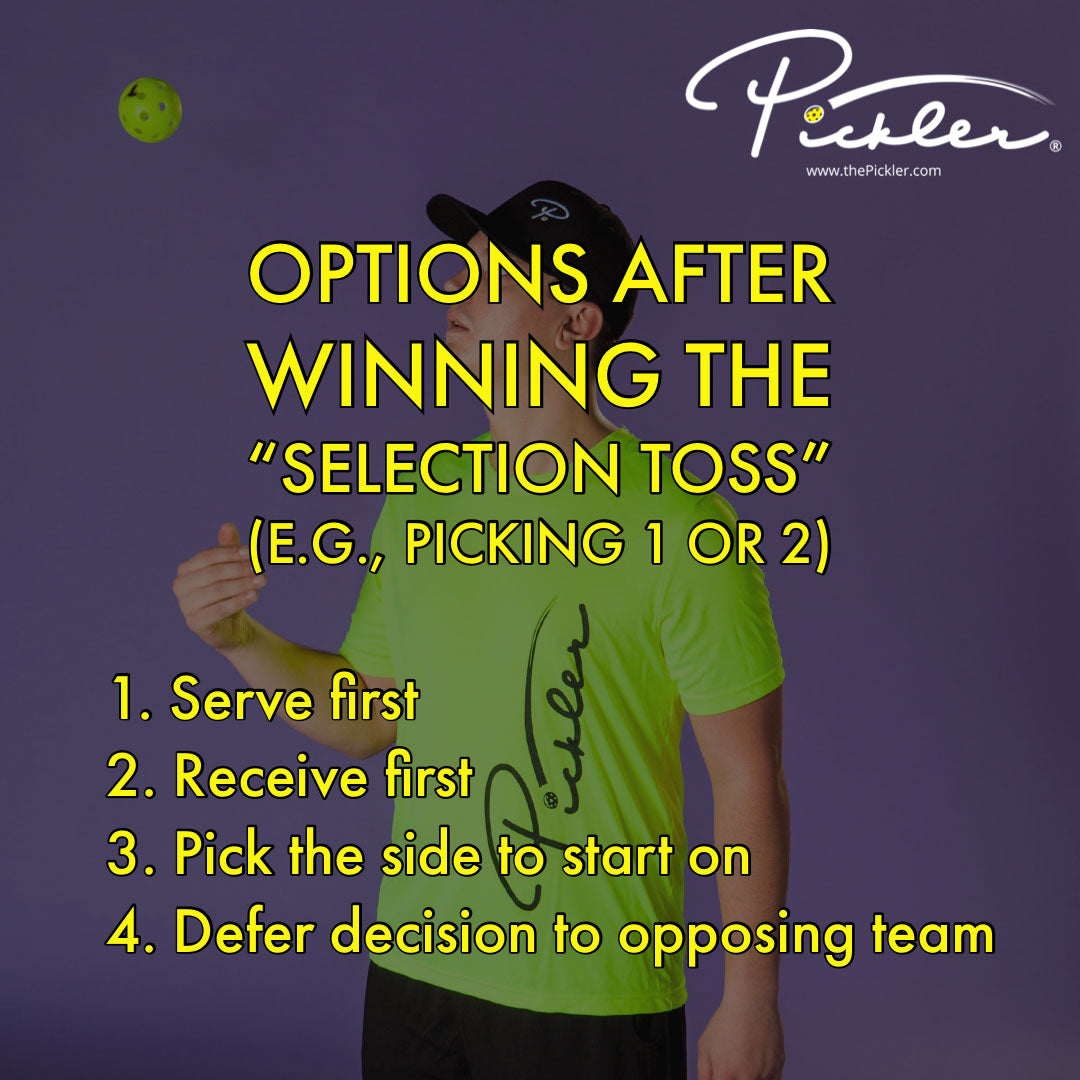
Choosing Servers on the Pickleball Court
In doubles pickleball, a team may change who is the starting server between games in a pickleball match. If a team fails to notify the referee, there is no fault or other penalty. However, the referee should be sure to verify the starting server before each game to ensure accurate scorekeeping. To help referees in tournament play for doubles pickleball, servers should wear the applicable server identification symbol (which is often a first server bracelet or wristband). If a player refuses to wear any required server identification symbol, then the match will result in a forfeit by the refusing player/team.
Changing Ends of the Pickleball Court
During pickleball matches in pickleball tournaments, players or teams will switch sides of the pickleball court in case one side of the court has more favorable conditions than the other. This changing of ends of the pickleball court helps even out external factors, such as sun or wind. Players will change ends of the pickleball court at the following points in time:
- During matches that are best two out of three games to 11 points, at the end of each of the first and second game and, if there is a third game, when the first player or team reaches 6 points;
- During matches that are one game to 15 points, when the first player or team reaches 8 points; and
- During matches that are one game to 21 points, when the first player or team reaches 11 points.
In each case, the player or team that reaches the point threshold will keep the serve.
When changing sides between pickleball games (in other words, between games one and two, and between games two and three, for matches that are best two out of three games to 11 points), the players will have a time-out of up to two minutes. When changing sides during a pickleball game (in other words, during the game three for matches that are best two out of three games to 11 points, or during matches that are one game to 15 points or one game to 21 points), the players will have a time-out of up to one minute to switch sides.
Since the time to change ends is deemed a time-out, coaching is permitted. As a result, partners may communicate with each other or receive coaching from individuals that are not playing on the court.
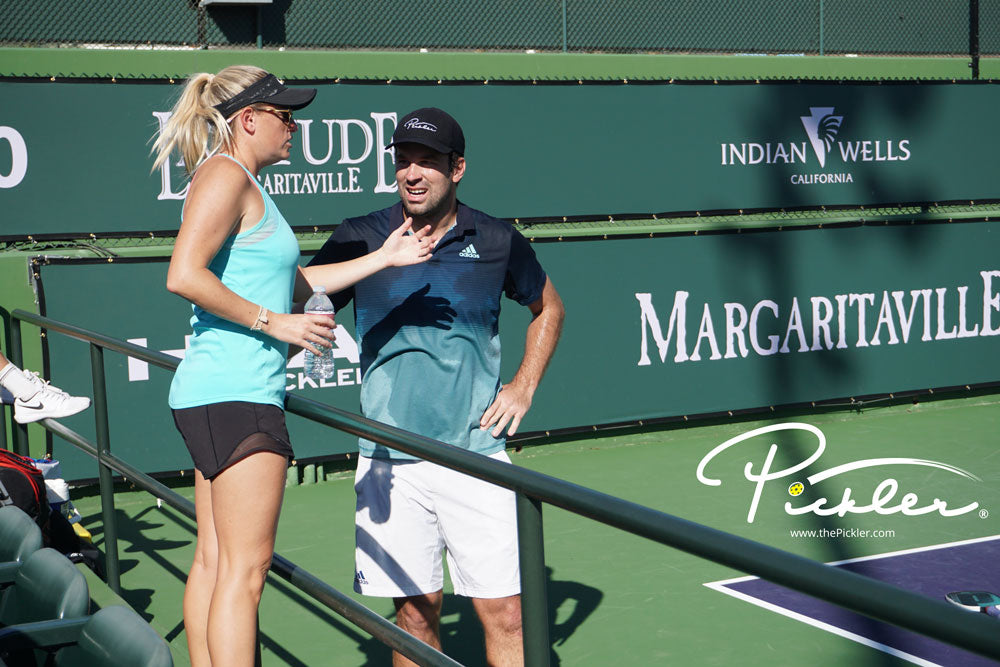
Playing Pickleball with a Referee and/or Line Judges
Responsibilities of a Pickleball Referee
A pickleball referee is responsible for enforcing the rules of the sport of pickleball. For instance, a referee’s responsibilities include, among others:
- Calling Non-Volley Zone faults, short serves, and service foot faults;
- Inspecting player equipment and court conditions;
- Calling the score and keeping score appropriately;
- Enforcing time-outs; and
- Maintaining player conduct.
The referee is also responsible for appeals requested by players. If the referee clearly saw the call, then the referee will make the appropriate call and the referee’s call will stand. However, if the referee did not clearly see the call, then the original call will stand. If no original call was made, then the pickleball will be presumed “in” or otherwise a live ball.
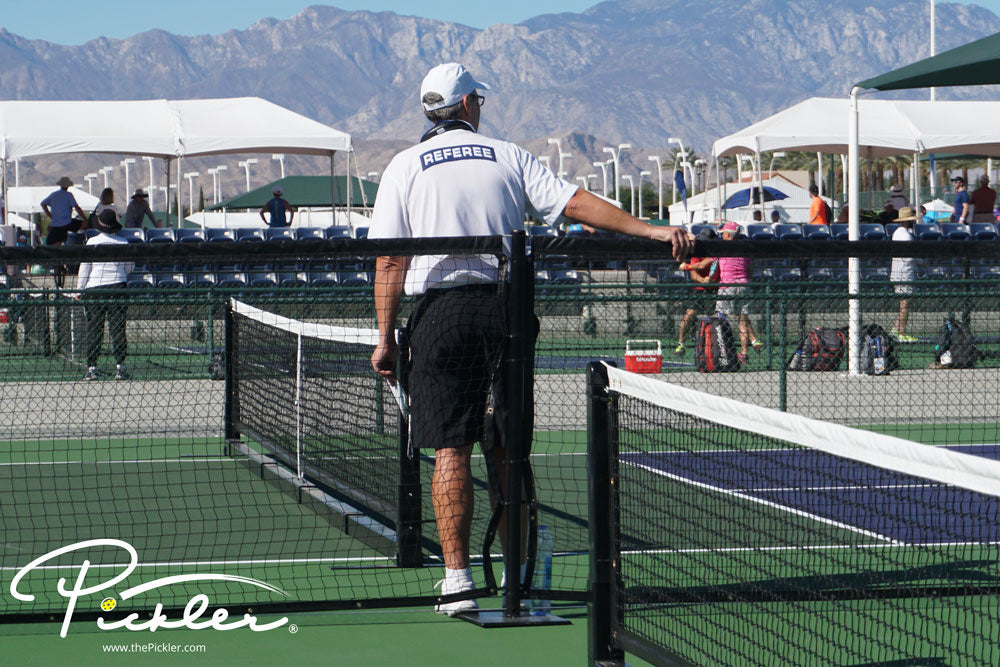
Line Calls with a Referee and/or Line Judges on the Pickleball Court
The general rules regarding line calls in pickleball is that line calls are made by the players on the pickleball court. Specifically, pickleball players make the line calls on their respective side of the pickleball court. The exception to this general rule is if a pickleball game or match has a referee or both a referee and line judges.
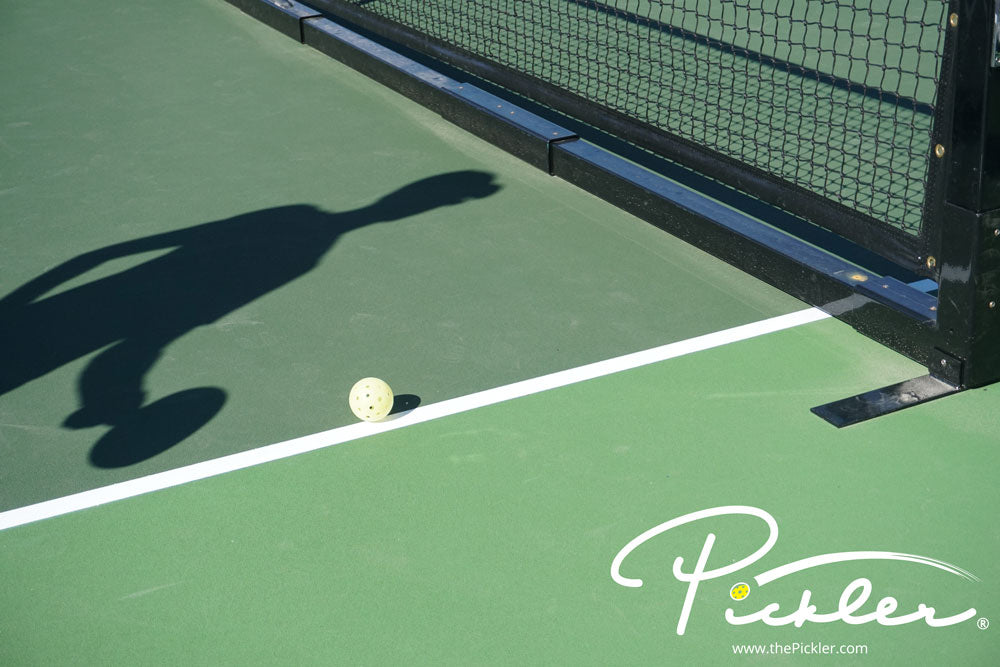
If a pickleball game or match has a referee, then the players on the pickleball court remain responsible for most line calls. The players will not be responsible for any service foot faults, Non-Volley Zone foot faults, short serves, or other Non-Volley Zone rules. Rather, the referee will be responsible for these faults, short serves, and other Non-Volley Zone rules.
If a pickleball game or match has a referee and line judges, then the players on the pickleball court will not be responsible for most line calls. Rather, the players will only be responsible for making the line call for the centerline on the serve. The referee and the line judges would be responsible for the remaining faults, short serves, rules, and line calls. Any line call by a player (other than the centerline on the serve) is invalid, unless it is to that player’s disadvantage.
If a pickleball match has both a referee and line judges, a player may appeal any line call by a line judge to the referee. If a referee overrules a line judge’s line call, then the players will replay the point. Further, if the line judges and referee are unable to make a line call, then the players will replay the point unless all of the players on the pickleball court agree that the pickleball was “out.”
Question a Rules Interpretation on the Pickleball Court
If a player disagrees with a referee’s ruling, then that player may appeal the ruling to the head referee or tournament director. However, if the referee’s ruling is correct, then the appealing player/team will lose a time-out and be given a technical warning. If the appealing player/team does not have any time-outs remaining, then the appealing player/team will be given a technical foul. If the referee’s ruling is incorrect, then the players will replay the point and there will no penalty.
Further, to note, any player in non-officiated play (in other words, play without a referee) may appeal a rule or resolve a dispute on the pickleball court by requesting a referee or the tournament director.
Remove a Referee or Line Judge on the Pickleball Court
A referee may only be removed if (1) all of the players on the pickleball court agree to petition to remove the referee; and (2) the tournament director agrees. A line judge may be removed by the referee for cause. A line judge may also be removed if (1) all of the players on the pickleball court agree to petition to remove the line judge; and (2) the referee agrees.
Questions that You May Ask a Referee Prior to a Serve
During pickleball tournament play, only certain questions are permitted to be asked to the referees on the pickleball court when it comes to the score and/or how to determine the correct score:
- The serving team may ask the following questions to the referee at any time prior to the serve:
- What is the score?
- Who is the correct server?
- Are we in the correct position?
- The receiving team may ask the following questions to the referee at any time prior to the serve:
- What is the score?
- Who is the correct receiver?
- Are we in the correct position?
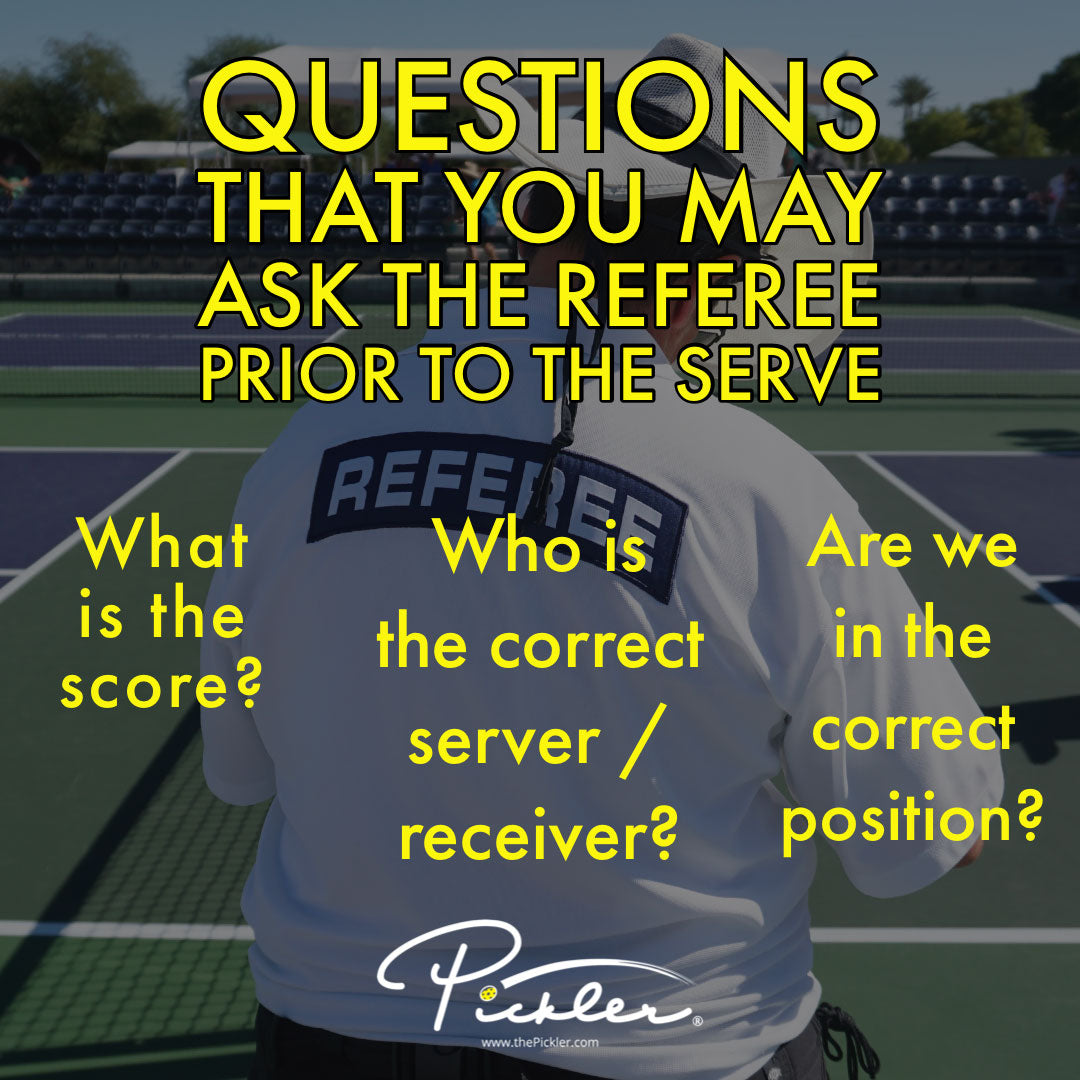
If the serving team or receiving team asks the referee any of these questions prior to the serve being struck, then the referee will call time, answer the question, and then re-call the score. However, if these questions are asked after the serve, then the referee will ignore the questions. Further, if the serving team or receiving team (as applicable) continuously asks these questions in an effort to delay or disrupt the pickleball game, then the referee may call a technical warning on the overly inquisitive team.
Time-Outs on the Pickleball Court
The Official Rulebook for pickleball provides for a slew of different time-outs, including standard time-outs, medical time-outs, hydration breaks, equipment time-outs, time between or before games, and time-outs for extenuating circumstances.
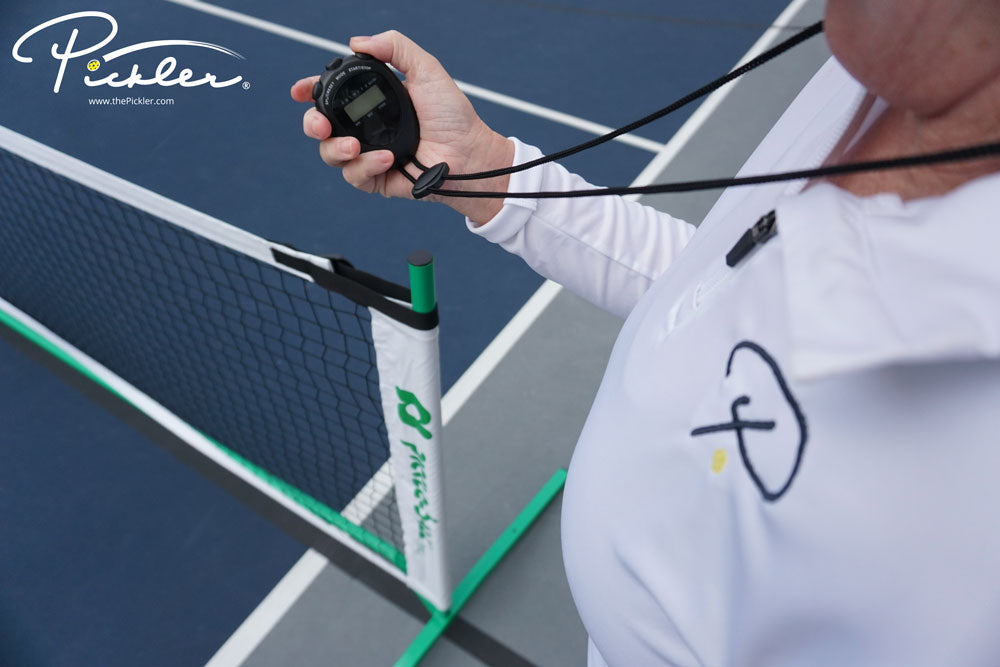
Standard Time-Outs in Pickleball
A pickleball team has two standard, one-minute time-outs per 11- or 15-point game (or three standard, one-minute time-outs per 21-point game). These standard time-outs may be called at any point during a game or at the start of game two or game 3 in a pickleball match that is best two out of three to 11 points. However, no pickleball time-out may be called before the start of a pickleball match. The referee will alert the players when there are 15 seconds remaining in a time-out. If the players on the court are ready to resume play before the one-minute time-out expires, then play may resume early.
To call a time-out, a player must alert the referee prior to the next serve. A time-out may not be called after the serve while the pickleball is in play. Otherwise, the player calling the time-out after the serve would have committed a fault.
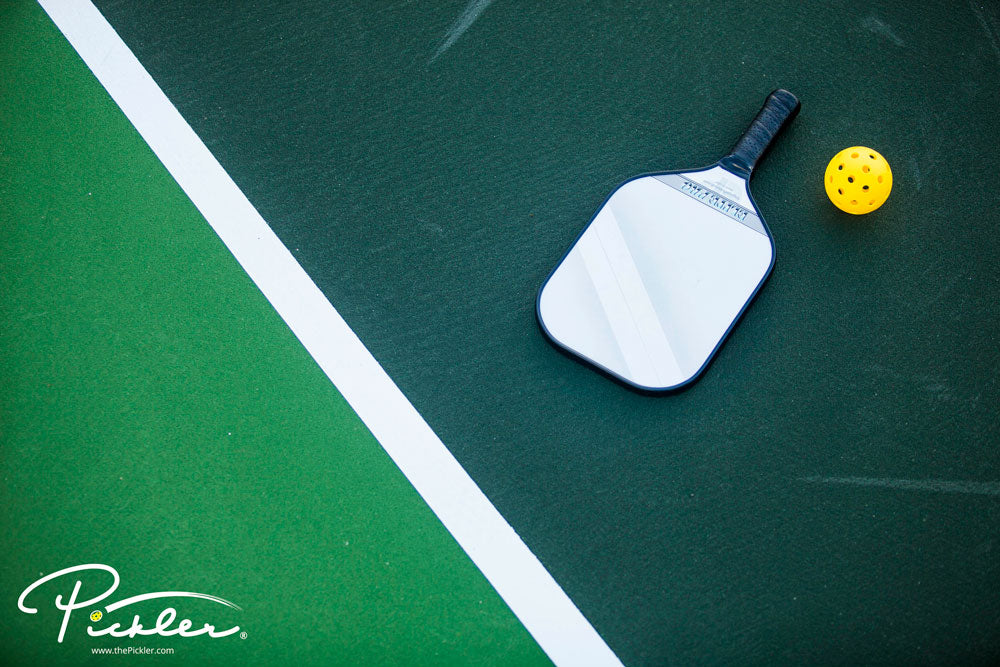
If a player calls a time-out before the serve, but has already used all of the available time-outs, then that player will not receive any penalty. However, if a player with no time-outs calls a time-out after the serve, then the player calling the time-out would have committed a fault.
When it comes to strategizing of when and how to use your time-outs, the general rule is to use your time-outs! If you do not use your time-outs, you do not get to keep them or take them home with you, so do not be afraid to use them. Time-outs can be one of the easiest ways to break or change the momentum of a pickleball game (and, as you may know, momentum is crucial in the game of pickleball!).
A good rule of thumb is to call a time-out if your opponents have scored three points in a row. A time-out will give you and your partner the opportunity to think and re-focus. Also, consider strategizing with your support team during time-outs. Your support team could add a fresh perspective to your strategy if you need it.
Medical Time-Outs on the Pickleball Court
A player that needs medical attention may request a medical time-out from the referee. Only one player-requested medical time-out is permitted per match per player. The referee may also call a medical time-out (even if not requested by a player) if the referee believes that a player needs medical attention. Medical time-outs should not last longer than 15 minutes. If the medical time-out is shorter than 15 minutes, the remaining minutes are lost. If the player requesting a medical time-out cannot resume play after the allotted 15 minutes, then the player/team will be required to forfeit the match.
If the medical personnel or tournament director determines that no valid medical condition warranted the medical time-out, then the requesting player/team will be charged with a standard time-out. If no standard time-outs are available, then the requesting player/team will be given a technical foul.
If a player is bleeding, a referee time-out will be called for the player to stop the bleeding and change clothing (if applicable). However, if the injury causing the blood is self-inflicted, then the requesting player/team will be charged with a standard time-out. If no standard time-outs are available, then the requesting player/team will be given a technical foul.
Quick Breaks on the Pickleball Court
Drink breaks or breaks to towel off are permitted between points on the pickleball court. However, the flow of the pickleball game must not be impacted.
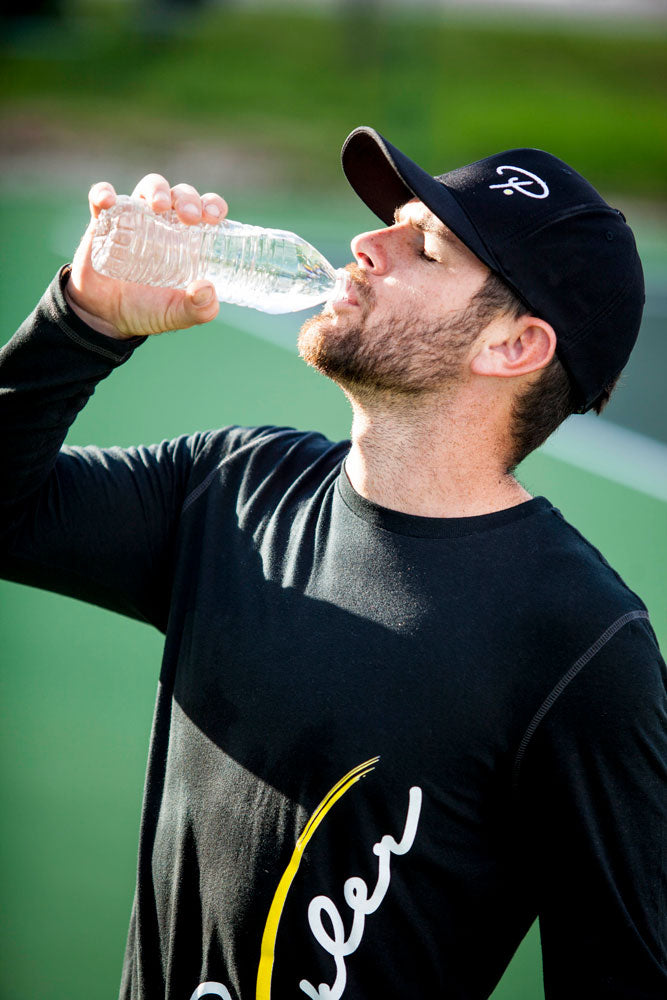
Equipment Time-Out Rules
Players are generally required to keep all apparel and equipment in good playing condition and to handle any adjustments before or after games or during time-outs. With that said, players may quickly adjust apparel and equipment between points on the pickleball court. For instance, players may tie shoes, clean glasses, switch paddles, or change hats between points on the pickleball court. Also, referees may grant equipment time-outs if a player or team is out of time-outs and the referee believes that a time-out is necessary for fair and safe continued play by the players.
Forfeits and Withdrawals on the Pickleball Court
A forfeit occurs when either (1) a player/team requests to award a game or match to the opponents (for instance, a player/team is unable to continue after an injury during a match), or (2) a player/team violates the rules or otherwise receives technical fouls or technical warnings that result in a game or match being awarded to the opponents. A player/team may request a forfeit before any pickleball match or during a pickleball match. If a player/team forfeits a match, then the score will be recorded as 11-0, 11-0 (or 15-0 or 21-0, as applicable, based on the applicable scoring for that match). All scores for pickleball matches prior to the forfeit will remain in place. However, despite the forfeit, the forfeiting player/team will be eligible to continue play in the tournament, assuming that the player/team was not otherwise eliminated based on the forfeit.
A withdrawal, on the other hand, is a player’s/team’s request to be removed from the scheduled bracket, and can only occur prior to the start of a pickleball match. Further, the withdrawal applies to the entire bracket, as the player/team would not be allowed to participate in any future matches in the pickleball bracket. The withdrawal will be scored as 0-0, 0-0 for best two out of three to 11 points (or 0-0 for one game to 15 or 21 points). Similar to a forfeit, any scores prior to the withdrawal will remain in place.
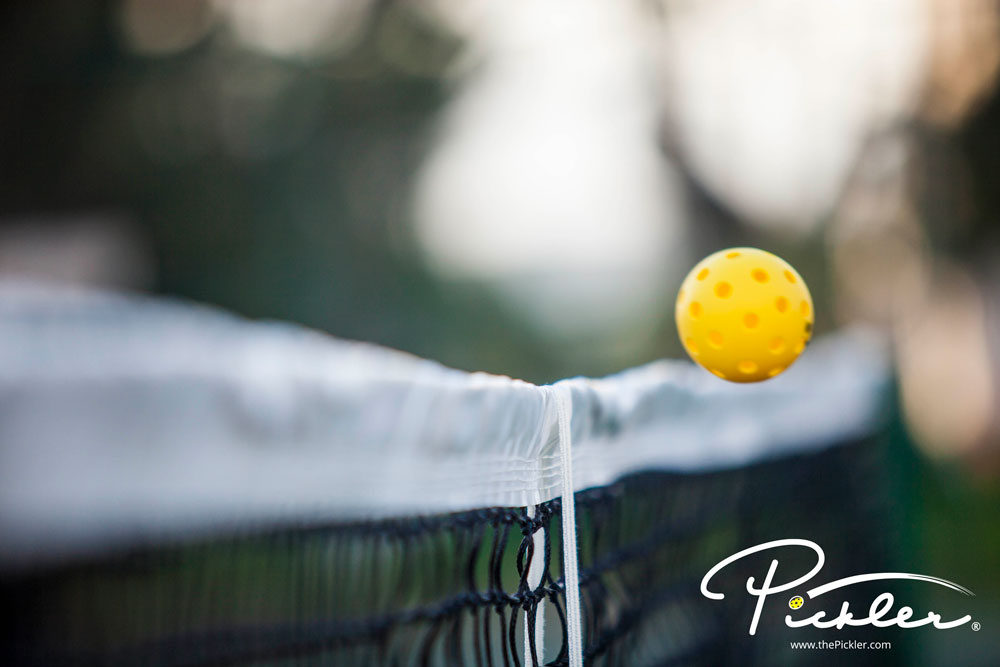
Technical Warnings, Technical Fouls, and Match Forfeits on the Pickleball Court
A technical warning is a verbal warning to a player by the referee for a rule or behavioral violation. No points are awarded in connection with a technical warning. A technical foul, on the other hand, is rule or behavioral violation that rises to the level of deducting a point from the offending team’s score (unless the score is zero, then a point will be added to the opposing team’s score). A technical foul will be given if the offending team has already received a technical warning. After a technical foul is given to a player/team, then the player/team must move on their own to reflect the new score. Neither a technical warning nor a technical foul will affect a server change or side out.
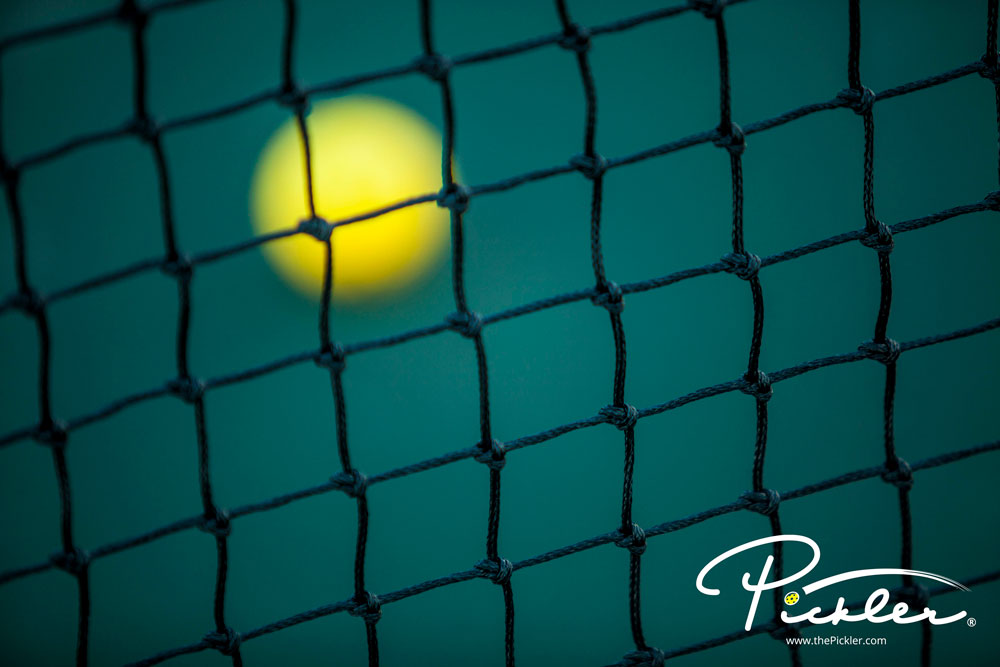
Examples of actions that may result in a technical warning include, among others:
- Objectionable language directed at another person;
- Profanity (including hand gestures) – To note, a referee may, if the referee does not believe that the profanity rose to the level of a penalty, give a single verbal warning for profanity that does not rise to the level of a technical warning. However, the referee may only give one verbal warning per match and the verbal warning would be deemed given to all players on the pickleball court;
- Aggressive arguing that disrupts the pace of the pickleball game;
- Abuse of the pickleball (such as breaking the pickleball on purpose);
- Excessive questioning or appeals that disrupts the pace of the pickleball game;
- Delay of the game;
- Improper medical time-out (but with a time-out remaining);
- Challenging a referee’s ruling and losing the challenge (but with a time-out remaining);
- Receiving coaching at any time, other than between games or during a time-out; or
- Other unsportsmanlike behavior (such as a pattern of questionable calls that are overruled).
Examples of actions that may result in a technical foul (and a point being deducted from the offending team’s score (unless the score is zero, then a point will be added to the opposing team’s score)) include, among others:
- Aggressively throwing a paddle with negligent disregard for any consequences, but does not hit any person or property;
- Aggressively hitting a pickleball that inadvertently hits a person;
- Extremely objectionable language or profanity, regardless of whether such language is directed at another person or not;
- Threats or challenges to another person;
- Improper medical time-out with no time-outs remaining;
- Challenging a referee’s ruling and losing the challenge, with no time-outs remaining; or
- Other unsportsmanlike behavior (such as a pattern of questionable calls that are overruled).
A referee will call a match forfeit if:
- A player/team has a technical warning and then receives a technical foul;
- A player/team has a technical foul and then receives either a technical warning or a technical foul;
- A player does not report to the pickleball court within 15 minutes of being called to play (to note, the referee, at the referee’s option, may even call a match forfeit as early as 10 minutes after being called to play);
- A player intentionally and aggressively makes physical contact with an opponent, tournament official, or spectator; or
- A player aggressively throws a paddle or hits a pickleball that endangers any person or property.
A tournament director may also call a match forfeit for player misconduct. A tournament director also has the power to eject a player from the tournament for flagrant behavior that endangers others, which includes, among other behavior:
- Ethnic, religious, racial, or homophobic slurs;
- Injury to any person through abuse of a paddle or pickleball;
- Spitting or coughing on another person; or
- Not playing with the player’s best effort on the pickleball court.
Looking for More Pickleball Rules?
We know pickleball rules can be tricky at times. Don’t worry. Pickler explains the ins and outs of all of the pickleball rules in a series of pickleball rules blogs to make sure that you make the right call on the pickleball court. Learn more by visiting Pickler’s pickleball rules blogs that are linked below!
- Pickleball Rules – The Ultimate Guide to the Rules of Pickleball
- 10 Must Know Pickleball Rules Before Your Hit the Court
- 10 Pickleball Rules Changes to Learn for 2021
- Pickleball Rules – Learn How to Start – 5 Things You Need to Play
- Pickleball Dictionary – Quickly Learn the Pickleball Vocabulary
- Pickleball Serving Rules – Master the Start of Every Pickleball Game
- Pickleball Scoring Rules – Learn How to Keep the Score in Pickleball
- Pickleball Kitchen Rules – Learn Important Non-Volley Zone Rules
- Pickleball Line Call Rules – How to Make the Right Call
- Pickleball Rules – Faults & Dead Balls on the Pickleball Court
- Pickleball Rules – Commonly Misunderstood Rules in Pickleball
- Pickleball Tournament Rules – Must Read Before a Tournament
- Singles Pickleball Rules – How to Play Singles Pickleball
- Wheelchair Pickleball Rules – How to Play Wheelchair Pickleball
Improve Your Pickleball Game Before Your Next Pickleball Tournament!
If you want to improve your pickleball game before your next pickleball tournament, check out Pickler’s online video lesson collection called My Pro Pickleball Coach. My Pro Pickleball Coach is a fraction of the price of one clinic or even one lesson, and features over 140 video lessons (over 7 hours of instruction!), as well as a corresponding e-book. These online video lessons are available on demand 24/7 and breakdown every aspect of the sport of pickleball, including pickleball mechanics and fundamentals, drills, strategy, and advanced concepts, so you will play your best pickleball.

